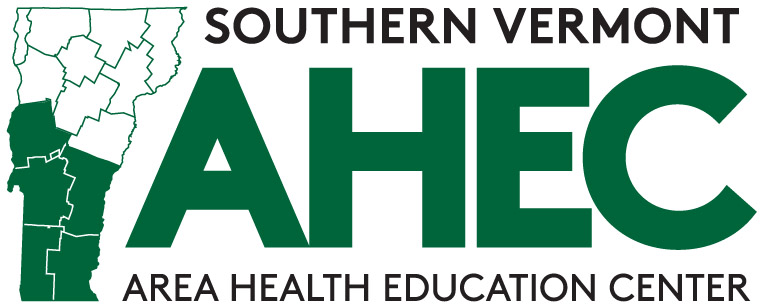Health Careers Awareness Month
October is Health Careers Awareness Month in the state of Vermont and we’re featuring AHEC flagship programs and more all month long!
Vermont highlights health careers in October
This article originally appeared in the Rutland Herald on October 7, 2021.
By Patrick Mcardle Staff Writer Oct 7, 2021
During a pandemic that has strained the resources and staff of health care providers across the state and throughout the country, it is more important than ever to educate the public and potential health care workers and recruit and retain qualified employees, according to Jennifer Scott, executive director of the Southern Vermont Area Health Education Center.
The Vermont Legislature designated October as Vermont’s Health Careers Awareness Month back in 2010.
“They recognize that a talented, qualified, engaged and diverse workforce is at the heart of Vermont’s health care infrastructure,” she said.
Scott said Vermont had one of the worst shortages of medical professionals like physicians, nurses, dentists, allied health and behavioral health professionals and the shortage in “rural and underserved communities remains critical.”
“While COVID has taken a heavy toll on health care teams who have been on the front lines of the pandemic, these challenges in the health workforce have pre-dated the pandemic,” Scott said.
The center, one of two in Vermont, works in partnership with the Office of Primary Care, an affiliated program, at the University of Vermont College of Medicine, as well as the national program and health care workforce stakeholders in Vermont, to improve distribution, diversity, supply and quality of health care workers.
Priscilla Latkin, director of the training and education department at Rutland Regional Medical Center and president of the board of directors at the education center, said MedQuest, another affiliated program, for high school students, engages with students who are beginning to develop a career path.
“They are given an opportunity to learn about jobs in health care … They are able to have those experiences by shadowing folks who work in health care. Sometimes it’s a physician, sometimes it’s a nurse, sometimes it’s a pharmacist, somebody who works in a lab (or) someone who works in maintenance and engineering. It could be across the spectrum,” she said.
Latkin said health care careers are not just clinical. She used examples like mechanical and engineering jobs for which there is an apprenticeship at Rutland Regional and education and training developers.
Scott said the Southern Vermont center is looking at ways to do more as the pandemic has drawn attention to the critical shortage of health care workers throughout the state and the country.
“How can we reach more students? How can we provide engaging and enriching activities for students who have endured a considerable amount (of challenges) in the last 18 months from an educational standpoint whether they’re learning from home or how their education has been interrupted in the last year? We’ve been very sensitive about that. What can we do to engage them in our programs, in education in health care exploration? How can we increase capacity in our already stretched health care teams in our service area with our college students interns?” she asked.
The center can also help with education loan repayment for practitioners who agree to provide service in the areas of greatest need.
Latkin added that the organization can also help with housing for medical students from out of state or provide scholarships, resources and outreach opportunities.
“They’re very instrumental in helping health care professionals to-be get to where they need to be and also get the exposure they need to obtain a career in health care,” she said.
Scott said having a month devoted to health careers is an important reminder.
“When is an appropriate and qualified health workforce not important, right? she asked.
She noted it’s not only important to personal health but also creates jobs, serves communities and spurs economic activity.
Latkin said she believes Vermonters appreciate the health care workers in their state.
“We still continue to receive thank-you cards from elementary school kids, recognition from patients or visitors that are coming into the hospital for services or procedures and just the fact that we continue to do what we have been doing since before the pandemic and we’ve done it through the pandemic,” she said.
Nicole LaPointe, executive director of the center, noted a bumper sticker commonly seen during the pandemic, “Not All Heroes Wear Capes” as a sign that members of the public are appreciating the “amazing and difficult work that health care providers provide in the community.”
